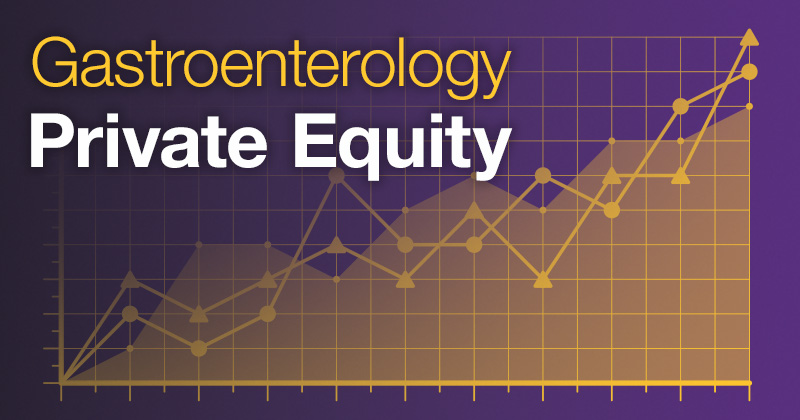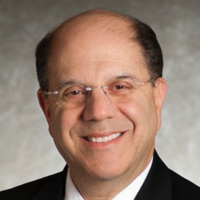Private Equity and Gastroenterology ASCs: 2019 Market Outlook

Here’s how private equity is affecting the GI industry
In recent years, the rise of private equity investment and consolidation in healthcare have become increasingly hot topics. And while gastroenterology remained largely untouched by private equity during the initial rise of healthcare investments, the market is now increasingly looking to gastroenterology—including GI ambulatory surgery centers (ASCs)—for opportunities.
Some believe that private equity represents an opportunity to increase efficiency and decrease costs for the healthcare system, while others fear that it may lead some organizations to emphasize profit above patients. But amid all the controversy, one thing remains clear: it’s showing no signs of slowing down.
What is private equity?
Before we dive deeper into what’s going on in the gastroenterology ambulatory surgery center market, let’s make sure we have a clear understanding of who is doing the investing.
A private equity firm is an investment management company that provides financial backing to startup or operating companies through a variety of methods including investing venture capital, growth capital and even managing leveraged buyouts.
Not to be confused with venture capital firms, private equity raises money to invest in an existing business and then sell for a profit after a short period of time (usually a few years).
There are hundreds of private equity companies in the US, involved in nearly every industry, and more and more of them have been turning their eyes toward healthcare.
The history of private equity in healthcare
Investment in healthcare is not entirely new, but the current frenzy began around five years ago, when many firms began investing in dermatology practices that had a largely cash-paying patient base.
As other companies saw these initial investors reap profits, they began to pursue similar investments, expanding in earnest into not just dermatology but also other specialties and areas of healthcare.
In fact, the 325 healthcare private equity deals seen in 2008 more than doubled to 788 in 2018, representing more than $100 billion in total value.
Of course, the state of the economy had a partial impact on that growth as well. As the US economy recovered from the 2008 recession, the private equity sector found itself with more resources available to invest, and the healthcare system has proven to be a lucrative outlet.
One industry research firm estimates that across the globe, a full 13 percent of all private equity buyouts are now in the healthcare industry.
Private equity in gastroenterology
So where does gastroenterology fit into all this?
As dermatology and certain other specialties become increasingly saturated with healthcare private equity deals and consolidation, companies are turning their eyes to additional markets that remain highly fragmented—gastroenterology being one.
In fact, there are about 24 US states that have no GI practices with more than 20 physicians.
From an investor’s perspective, taking a number of undercapitalized, independent practices that operate in data silos and uniting them on the same platform can reduce redundancy and achieve economies of scale. Plus, their size can provide additional leverage to help improve payer negotiations.
To a large extent, this idea of efficiency through consolidation is the same concept that’s already been driving individual physician practices to consolidate with each other. Private equity simply represents another ownership option in addition to joining a physician-owned group or selling to a hospital.
However, with many gastroenterologists having grown accustomed to their independence, they may be reluctant to give it up.
Another aspect that makes gastroenterology appealing to investors is the presence of ancillary services such as diagnostic procedures, imaging and surgery. This is especially important given the aging population and their increasing demand for these services.
Even in the case of an economic slump, demand for gastroenterology is likely to remain more stable compared to demand for more discretionary goods and services. And, as always, US healthcare spending is projected to continue increasing in the future.
As these auspicious factors align, the private equity industry is feeling out the gastroenterology market, and there have already been several major GI private equity deals.
In fact, industry experts have speculated that 6-8 GI private equity deals could close in the first half of 2019 alone.
2019 & beyond private equity market outlook
Taking a closer look at the factors at play for 2019, we see that private equity companies are increasingly investing in other sectors of healthcare, such as hospitals, ASCs and technology, rather than just physician practices.
Ultimately, because their profit margins are so small, hospitals may prove less appealing to private investors. Private equity companies typically like to hold onto a company for 3-5 years before selling, but they may need to hold onto the hospital system for longer to generate a sufficient return on investment.
Despite this, some private equity groups like Apollo Global are investing heavily in hospitals. If they succeed in the long run, others may follow.
Another major trend in the industry affecting both hospitals and ASCs is the shift within outpatient reimbursements. Increasingly, the Centers for Medicare and Medicaid Services (CMS) is looking to see more procedures performed at ASCs instead of hospital outpatient departments (HOPDs) where possible.
This is projected to save billions of dollars per year for the healthcare system as a whole, while increasing volume and reimbursements for ASCs over time. It’s also part of why a higher proportion of ASC reimbursements is now coming from the government rather than from commercial payers.
This shift toward ambulatory surgery centers provides further incentive for private equity to invest in GI organizations because gastroenterologists perform so many ASC-based procedures. Private equity companies see gastroenterology ambulatory surgery centers as a promising opportunity to diversify their holdings, and there’s still plenty of room for consolidation in the ASC gastroenterology market.
And as an increase in margin compression makes it harder to grow reimbursements, many ASCs are now being driven to merge in an effort to improve profitability through economies of scale.
Across all specialties, healthcare private equity funding in ASCs has reached nearly an all-time high, and the industry has nearly $1 trillion in unused capital. And the more gastroenterology ambulatory surgery centers open and consolidate, the more interested private equity companies become in investing, and the more they’re often willing to pay to acquire them.
Conclusion
Across the entire healthcare industry, private equity investment continues to grow as firms recognize opportunities to improve efficiency through consolidation. In particular, gastroenterology ambulatory surgery centers and practices are garnering attention due to a variety of factors, including increasing outpatient procedure volume and demand for GI services.
Whether you’re looking to maintain your independence or expand your organization by partnering with a healthcare private equity firm or health system, analysts agree that leveraging the right technology is paramount to achieving success.
How? With the ability to manage the clinical, financial and operational aspects of your organization in a seamless gastroenterology software system, you can more easily visualize areas that may need improvement. This helps you more efficiently operate your ASC and your practice. Moreover, the ability to aggregate quality and cost data through integrated analytics can aid in payer negotiations.
All this, in turn, can translate to improved efficiency and performance that help equip your gastroenterology ambulatory surgery center to thrive in a rapidly changing industry.
Sources
Berlin A. LPC: KKR’s Covenant Surgical Partners buy supported by US$195m loan. Reuters. https://www.reuters.com/article/covenant-surgicallbo/lpc-kkrs-covenant-surgical-partners-buy-supported-by-us195m-loan-idUSL2N1LP0WH. Published September 8, 2017. Accessed April 5, 2019.
Chen J. Private Equity Definition. Investopedia. https://www.investopedia.com/terms/p/privateequity.asp. Published March 13, 2019. Accessed April 5, 2019.
Cockrell G. Trends in Gastroenterology, Urology and Men’s Health Investments – 5 Key Points. The Healthcare Investor. https://www.thehealthcareinvestor.com/2019/03/articles/healthcare-services-investing/trends-in-gastroenterology-urology-and-mens-health-investments-5-key-points/. Published March 8, 2019. Accessed April 4, 2019.
Lagasse J. PwC: Healthcare private equity investments to skyrocket in 2019. Healthcare Finance News. https://www.healthcarefinancenews.com/news/pwc-healthcare-private-equity-investments-skyrocket-2019. Published March 26, 2019. Accessed April 4, 2019.
Liss S. Private equity sees ripe opportunity in healthcare this year. Healthcare Dive. https://www.healthcaredive.com/news/private-equity-sees-ripe-opportunity-in-healthcare-this-year/548831/. Published March 25, 2019. Accessed April 5, 2019.
Oliver E. PE groups eye Peak Gastroenterology Associates – 4 insights. Becker’s ASC Review. https://www.beckersasc.com/gastroenterology-and-endoscopy/pe-groups-eye-peak-gastroenterology-associates-4-insights.html. Published March 19, 2019. Accessed April 5, 2019.
Pazanowski MA. Private Equity Investment in Health Care Stays Strong (Corrected). Bloomberg Law. https://www.bna.com/private-equity-investment-n73014482737/. Published September 21, 2018. Accessed April 4, 2019.
Spitzer J. 8 consolidation, private equity trends for ASC leaders to know. Becker’s ASC Review. https://www.beckersasc.com/asc-transactions-and-valuation-issues/8-consolidation-private-equity-trends-for-asc-leaders-to-know.html. Published October 30, 2018. Accessed April 4, 2019.
Wikipedia contributors. Private equity firm. Wikipedia, The Free Encyclopedia. October 15, 2018, 00:27 UTC. Available at: https://en.wikipedia.org/w/index.php?title=Private_equity_firm&oldid=864083281. Accessed April 5, 2019.





